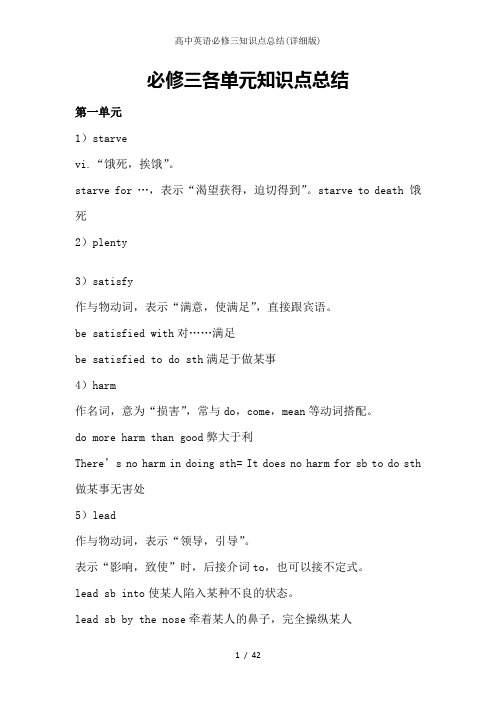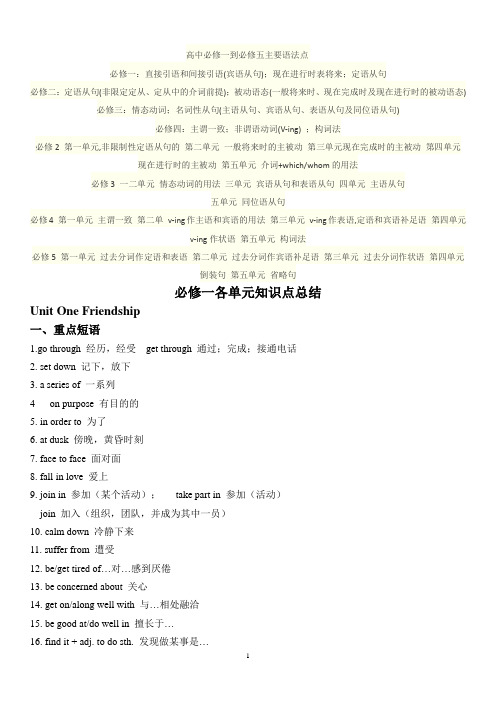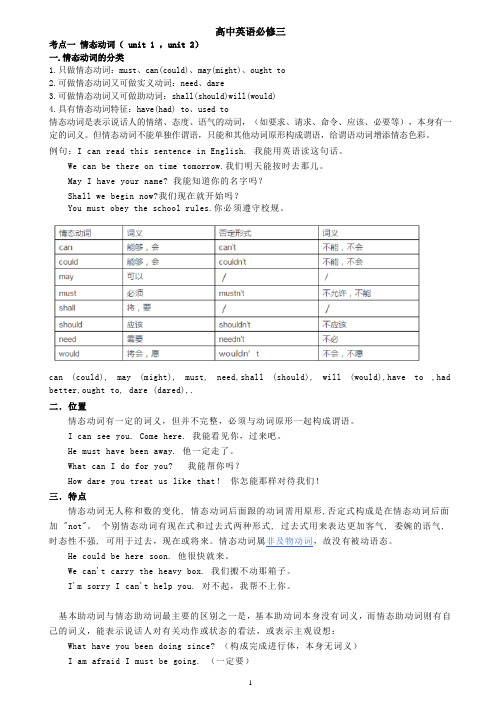(完整word)高中英语必修三情态动词语法
高中英语必修三知识点总结(详细版)

必修三各单元知识点总结第一单元1)starvevi.“饿死,挨饿”。
starve for …,表示“渴望获得,迫切得到”。
starve to death 饿死2)plenty3)satisfy作与物动词,表示“满意,使满足”,直接跟宾语。
be satisfied with对……满足be satisfied to do sth满足于做某事4)harm作名词,意为“损害”,常与do,come,mean等动词搭配。
do more harm than good弊大于利There’s no harm in doing sth= It does no harm for sb to do sth 做某事无害处5)lead作与物动词,表示“领导,引导”。
表示“影响,致使”时,后接介词to,也可以接不定式。
lead sb into使某人陷入某种不良的状态。
lead sb by the nose牵着某人的鼻子,完全操纵某人lead a dog’s life过困难的生活lead the way带路,带头lead to 导致,致使6)origin是名词,表示“起源,起因,出身”。
be of origin起源于,出身于7)event是名词,表示“事变,事件”,既可以指历史上的,国际上的,国内的大事件,也可以指日常事件,复数形式还可以指事态的发展和结局。
也可以指体育比赛中的“项目”。
常见词组:at all events/in every event总之,无论如何,不管怎样in the event结果,终于 in the event of万一,如果,倘若 in that event若果那样的话8)dress作与物动词,表示“给……穿衣”,后接人作宾语,也可以做不与物动词,表示“穿上衣服,穿着衣服”。
dress up穿上盛装,打扮dress作不可数名词,表示“衣服”;作可数名词,表示“妇女与儿童的衣服”。
dress sth up修饰,掩饰9)trickplay a trick on sb=play sb a trick开某人的玩笑,诈骗某人do/turn the trick达到(预期的)目的,获得成功。
语法 Modal Verbs情态动词 课件 2021-2022学年高中英语人教新课标必修三

I commanded that you (should) go to the front immediately.
重点语 法规则!
宾语从句
从句的谓语:should+动词 原形,其中should可以省略
虚拟语气
常见的,后接宾从要用虚拟语气的动词还有:
四个“要求”:request, require, demand, desire
Your parents will try their best to help you. 你的父母会尽最大努力帮助你。
用法:
① 表示义务、必要或命令 : You must come early tomorrow.
② 表示推测“肯定,一定”: They must be at home. The light is on.
Tom can swim. =Tom is able to swim.
汤姆会游泳。
can
(could)
(疑问句中)表示 请求
可以 Could you give us a hand?
你可以帮我们一下吗?
(否定句、疑问 句中)表示可能 性
The boy can’t be Jim. He’s can可能 much taller.
2. 实义V.
肯:dare to do 否:don't dare to do
e.g.: I dare to swim . He doesn’t dare to swim.
1. You ____to the meeting this afternoon .
A needn’t to come
B don’t need come
need 需要,有必要
1. 情态V, 肯:need do 否:needn't do
(完整版)人教版高中英语必修语法知识点总结

高中必修一到必修五主要语法点必修一:直接引语和间接引语(宾语从句);现在进行时表将来;定语从句必修二:定语从句(非限定定从、定从中的介词前提);被动语态(一般将来时、现在完成时及现在进行时的被动语态) 必修三:情态动词;名词性从句(主语从句、宾语从句、表语从句及同位语从句)必修四:主谓一致;非谓语动词(V-ing) ;构词法必修2 第一单元,非限制性定语从句的第二单元一般将来时的主被动第三单元现在完成时的主被动第四单元现在进行时的主被动第五单元介词+which/whom的用法必修3 一二单元情态动词的用法三单元宾语从句和表语从句四单元主语从句五单元同位语从句必修4 第一单元主谓一致第二单v-ing作主语和宾语的用法第三单元v-ing作表语,定语和宾语补足语第四单元v-ing作状语第五单元构词法必修5 第一单元过去分词作定语和表语第二单元过去分词作宾语补足语第三单元过去分词作状语第四单元倒装句第五单元省略句必修一各单元知识点总结Unit One Friendship一、重点短语1.go through 经历,经受get through 通过;完成;接通电话2. set down 记下,放下3. a series of 一系列4 on purpose 有目的的5. in order to 为了6. at dusk 傍晚,黄昏时刻7. face to face 面对面8. fall in love 爱上9. join in 参加(某个活动);take part in 参加(活动)join 加入(组织,团队,并成为其中一员)10. calm down 冷静下来11. suffer from 遭受12. be/get tired of…对…感到厌倦13. be concerned about 关心14. get on/along well with 与…相处融洽15. be good at/do well in 擅长于…16. find it + adj. to do sth. 发现做某事是…17. no longer / not …any longer 不再…18. too much 太多(后接不可数n.)much too 太…(后接adj.)19. not…until 直到…才20. it’s no pleasure doing sth 做…并不开心21. make sb. sth. 使某人成为…make sb. do sth. 使某人做某事二、语法----直接引语和间接引语概念:直接引语:直接引述别人的原话。
人教版高中英语必修3 五个单元语法知识点汇总

高中英语必修三考点一情态动词( unit 1 ,unit 2)一.情态动词的分类1.只做情态动词:must、can(could)、may(might)、ought to2.可做情态动词又可做实义动词:need、dare3.可做情态动词又可做助动词:shall(should)will(would)4.具有情态动词特征:have(had) to、used to情态动词是表示说话人的情绪、态度、语气的动词,(如要求、请求、命令、应该、必要等),本身有一定的词义。
但情态动词不能单独作谓语,只能和其他动词原形构成谓语,给谓语动词增添情态色彩。
例句:I can read this sentence in English. 我能用英语读这句话。
We can be there on time tomorrow.我们明天能按时去那儿。
May I have your name? 我能知道你的名字吗?Shall we begin now?我们现在就开始吗?You must obey the school rules.你必须遵守校规。
can (could), may (might), must, need,shall (should), will (would),have to ,had better,ought to, dare (dared),.二.位置情态动词有一定的词义,但并不完整,必须与动词原形一起构成谓语。
I can see you. Come here. 我能看见你,过来吧。
He must have been away. 他一定走了。
What can I do for you? 我能帮你吗?How dare you treat us like that!你怎能那样对待我们!三.特点情态动词无人称和数的变化, 情态动词后面跟的动词需用原形,否定式构成是在情态动词后面加 "not"。
个别情态动词有现在式和过去式两种形式, 过去式用来表达更加客气, 委婉的语气, 时态性不强, 可用于过去,现在或将来。
(完整word版)高中英语语法整理总结,推荐文档

高中英语语法整理总结组成句子的各个部分叫句子成分。
英语句子成分有主语,谓语,表语,宾语,宾语补足语,定语,状语等。
顺序一般是主语,谓语,宾语,宾语补足语,而表语,定语,状语的位置要根据情况而定。
1、主语主语表示句子主要说明的人或事物,一般由名词,代词,数词,不定式等充当。
He likes watching TV .他喜欢看电视。
2、谓语谓语说明主语的动作,状态或特征。
一般可分为两类:1)简单谓语由动词(或短语动词)构成。
可以有不同的时态,语态和语气。
We study for the people. 我们为人民学习。
2)复合谓语:情态动词+不定式I can speak a little English. 我可以说一点英语。
3、表语表语是谓语的一部分,它位于系动词如be 之后,说明主语身份,特征,属性或状态。
一般由名词,代词,形容词,副词,不定式,介词短语等充当。
My sister is a nurse. 我姐姐是护士。
4、宾语宾语表示动作行为的对象,跟在及物动词之后,能作宾语的有名词,代词,数词,动词不定式等。
We like English. 我们喜欢英语。
有些及物动词可以带两个宾语,往往一个指人,一个指物,指人的叫间接宾语,指物的叫直接宾语。
He gave me some ink. 他给了我一点墨水。
有些及物动词的宾语后面还需要有一个补足语,意思才完整,宾语和它的补足语构成复合宾语。
如:We make him our monitor. 我们选他当班长。
5、定语在句中修饰名词或代词的成分叫定语。
用作定语的主要是形容词,代词,数词,名词,副词,动词不定式,介词短语等。
形容词,代词,数词,名词等作定语时,通常放在被修饰的词前面。
He is a new student. 他是个新生。
但副词,动词不定式,介词短语等作定语时,则放在被修饰的词之后。
The bike in the room is mine. 房间里的自行车是我的。
必修三英语unit1情态动词的用法

更客气的 请求
过去的意志, 过去的
意愿
倾向或
习惯
过去某特定 情况会发生 的事情
shall:
1.Shall用于第一、第三人称疑问 句中,表示说话人征求对方的意 见、向对方请示或提供帮助 。
1.Shall we begin our lesson? 2.When shall he be allowed to leave hospital? 3.Shall I carry this bag for you?
can, may, will. 3 can 用于肯定句中, 可表示”有时可能”
情态动词 含义 否定式
注意点
表能力 can’t/couldn’t 区别 be “能,会”“不会,不能” able to
can / could
表许可 can’t /couldn’t
“可以” “不可以,不许”
表推测 can’t /couldn’t 主要用于
very get
out
2. 表“许可”,译为“可以”, could比can语气较委婉。用can 或cannot / can’t 回答
--Can /Could I borrow your bike
for a moment? --Yes, you can. / No, you can’t.
3. 表“可能性”,译为“可能”; Can this news be true? Where can they be? 否定句中,翻译为“不可能” She can’t have left school, for
A. wouldn't B. needn't C. mustn't D. daren't
3. - May I smoke here ? - If you __, choose a seat in the smoking
英语必修三情态动词
情态动词情态动词表示说话人对某一动作或状态的态度,认为“可能”“应该”“必要”等。
情态动词本身词义不完全,不能单独用作谓语,必须和不带to的不定式(即动词原形)连用。
情态动词没有人称和数的变化。
情态动词的否定式一般是在它们的后面加否定词not构成。
朗读时,情态动词的肯定式一般不重读。
一、can和could的用法(一)can的用法1.表“能力”。
Eg. Our company can keep pace with changes in the market.Specially-trained dogs can smell out drugs.2.表“许可”。
Eg. –- Can I use your mobile phone?--- I’m afraid not. I am expecting a call.3.表“可能性”。
多用于否定与疑问句中,但也可用于肯定句中表示理论上的可能性。
Eg. Can there be life on Mars?You can’t be tired ----you’ve only been working for an hour.You can’t have slept through that thrilling performance.4.表其他。
如“请求”“命令”“惊讶”“迷惑”“不相信”等态度。
Eg. Can you help me to lift it, please?If you won’t keep quiet, you can get out!She has left her husband, but can you blame her after the way he treated her?You can’t be serious!(二)could的用法:1.表“过去能够做某事”这样一种事实,但不指具体的某次行为。
Eg. I could read when I was three years old.He was so drunk that he couldn’t find the front door.2.表“过去的可能与许可”。
高中英语语法讲解: 情态动词
高中英语语法讲解:情态动词概述1.共有10个情态动词:can/could, may/might, will/would, shall, should, ought to, must;2个半情态动词need, dare2.特点:(1)情态动词后加动词原形(即不带to的不定式)一起构成谓语;(2)没有人称和数的变化;(3)多数情态动词有过去式,但其过去式有时并不表示时态,而只起“委婉或不确定语气”的作用。
Would you do me a favour? She may/might be watering the flowers now.3.情态动词在句子中可发挥不同作用,如表能力,表责任与义务,表推测,表征求允许,表请求,表建议,表语气态度等等He can/could run 100 meters in 11 seconds.You should/ought to/must work hard to win a gold medal.Can/Could/May/Might I watch the Olympics tonight?Will/Can/Could/Would you help me with my training?He might/may/could/should/ought to/will/must watch the football match tonight.I suggest that you should watch the opening ceremony.Can this be true?4.情态动词+do 表对一般现在或将来情况的推测情态动词+ be doing 表对正在发生的事情的推测情态动词+have done 表对过去已经发生的事情的推测一、can/could 的用法1.表能力(1) can do现在一般的能力(2) could do过去一般的能力(3) could have done过去有能力做但没做具体某事(4)was/were able to do = managed to do/ succeeded in doing 过去有能力做且做了具体某事。
高一英语英语必修3Unit1语法情态动词课件
2021年1月8日星期五
10
4.shall和should
shall 用法 1. shall表征求意见,用于一三人称 疑问句中
Shall we go by train, Mom? Shall he attend the meeting? 2.用于二 三人称 的陈述句中,表威胁警告命令允诺等语 气 You shall get a present when I came back. You shall be punished if you break the rules.
weekends.
2021年1月8日星期五
9
would & used to (过去常常,习惯于) would 现在有可能做,也有可能不做 used to 现在一定没有做 There used to be a big tree. I would go to the library when I was free. I _u_s_e_d_t_o_ to cry when I was a child.
2021年1月8日星期五
2
• 情态动词的特点: 1.情态动词自身都有一定的意义, 但不能表示正在发生或已经发生的 事情,只表示期待或估计某事发生。 2.情态动词除ought和have外,后 面必须接不带to的不定式。 3.情态动词没有人称和数的变化, 也没有非谓语形式。
2021年1月8日星期五
3
1. can和could
I’ve got a cold, so I have to see a doctor.
---Must I stay here?
---Yes, you must./
No, you needn’t./you don’t have to. ★mustn‘t 表禁止,不准,一定不要。
人教版高中英语(必修3)重点词汇、短语、句型、语法全汇总
人教版高中英语(必修3)重点词汇、短语、句型、语法全汇总Unit1 Festivals around the world重点词汇1.take place 发生2.religious 宗教的3.in memory of 纪念4.belief 信任,信心,信仰5.dress up 盛装,打扮6.trick 诡计,窍门7.play a trick on 搞恶作剧,诈骗8.gain 获得9.gather 搜集,集合10.award 奖品,授予11.admire 赞美,钦佩12.look forward to 期望,盼望13.day and night 日夜14.as though 好像15.have fun with 玩的开心16.permission 许可,允许17.turn up 出现,到场18.keep one's word 守信用19.hold one's breath 屏息20.apologize道歉21.obvious 显然的22.set off 出发,动身,使爆炸重点短语1.mean doing sth. 意味着mean to do sth. 打算或企图做某事mean sb. to do sth. 打算让某人做某事be meant for 打算作……用; 为…而有2.take place 发生;举行3.of all kinds 各种各样的4.starve to death 饿死be starved of 缺乏starve for sth, starve to do 渴望5.plenty of 大量; 充足6.be satisfied with对......感到满意to one's satisfaction令某人感到满意7.do harm to sb.=do sb. harm 伤害某人8.in the shape of 呈…的形状,以…的形式9.in memory of/ to the memory of sb.纪念某人10.dress up 穿上最好的衣服;打扮,化装11.award sth.(to sb.)和award sb.sth.(for sth.) 颁奖reward sb. for sth. 因…奖赏某人reward sb. with sth. 用某物酬劳某人12.admire sb. for sth在某方面钦佩某人13.look forward to期望,期待,盼望14.have fun with(与某人)玩得开心;过得快乐( have a good time;enjoy oneself.)15. turn up 出现;调大/高turn down 拒绝;调小/低turn off 关掉turn on 打开turn out 结果是......turn to sb. for help 向某人求助16.keep one's word 守信用break one's word, 失信17.It be obvious that-clause显而易见;一目了然18.set off 出发; 使(地雷、炸弹)爆炸set in 开始set up 建立,创立set out to do = set about doing sth. 着手做set down 写下,记下19.remind sb. of sth. 提醒,使想起重点句型1.Please make sure when and where the accident took place.请查清楚事故是何时何地发生的。
- 1、下载文档前请自行甄别文档内容的完整性,平台不提供额外的编辑、内容补充、找答案等附加服务。
- 2、"仅部分预览"的文档,不可在线预览部分如存在完整性等问题,可反馈申请退款(可完整预览的文档不适用该条件!)。
- 3、如文档侵犯您的权益,请联系客服反馈,我们会尽快为您处理(人工客服工作时间:9:00-18:30)。
高中英语必修三情态动词(unit 1 ,unit 2)一、情态动词的特点:1.没有人称和数的变化。
2. 有些情态动词有过去式的变化:e.g. will → would , can → could , may→ might ,dare → dared二、情态动词的否定式:情态动词+ not +动词原形can not: can't , must not: mustn't , need not : needn't三、情态动词的用法及相互区别, 是考试的内容之一1. can , be able to be able to 表示经过努力后, 能够做到; be able to 有多种形式的变化。
can1). 表示体力或脑力方面的能力;2). 表示允许、可能性。
could 是can的过去式, 表示过去有能力及过去存在的可能性; 用于疑问句表示委婉地提出问题。
1) The fire spread through the hotel very quickly but everyone ____ get out. (NMET 97 )A. had toB. wouldC. couldD. was able to2) -Will you stay for lunch?-Sorry, __. My brother is coming to see me. (NMET99)A. I mustn'tB. I can'tC. I needn'tD. I won't2.may 表示询问或说明一件事可不可做; 表示某事有可能发生。
might是may的过去式; 用在疑问中比may委婉、客气。
1) -May I take this book out of the reading-room?-No, you mustn't. ( Yes, you may.)2) -Might I make a suggestion? -Yes, you may.3. must1). 表示必须要做的事: 必须2) 表示很有把握的推断: 一定, 准是。
have (has)to : have (has)got to 必须, 不得不。
过去式: had to3) -Must I get to the station before three o'clock?-Yes, you must. ( No, you needn't. )4) I'm afraid you will have to wait a while.5) She must be in the classroom now.6) Mary ____ be in Paris, I saw her in town only a few minutes ago. (NMET 94)A. mustn'tB. shouldn'tC. can'tD. may not4. shall1) 在疑问句中, 用于第一、三人称表示说话人征求对方的意见或向对方请求。
2) 用于二、三人称,表示说话人给对方的命令、警告、允诺等概念。
1) - Shall I place an order with you now? -No, you needn’t.-Shall he turn down the radio a bit? -Yes, please.(No, please don't.)2) You shall have the English book as soon as I finish it.3) Everything that he owns shall be taken away from him.4) Your brother seldom comes to see you, ____?A. does heB. doesn't heC. will heD. isn't he5) It's a fine day. Let's go fishing, ____?A. won't weB. will weC. don't weD. shall we5. should 应该; 应当1) You should listen to the doctor's advice.2) You should study the article carefully.6. will, would1) 在疑问句中用于第二人称,表示说话人向对方提出请求或询问。
用would语气更加婉转。
2) will 表示现在的习惯性动作或状态; would 表示过去的习惯性动作或状态。
3) will 用于各种人称, 表示意志、意愿、决心、允诺; would 表示过去时间的意志、意愿、......。
(1) Don't smoke in the meeting room, ___ you?A. do youB. will youC. can youD. could you-Will you come with me? -Yes, I will.(I am sorry , I can't.)(2) -Would you tell us something about yourself? -Yes, I will.(3) - It's my birthday tomorrow. Don't forget to come to my party.- _____ .A. I don'tB. I won'tC. I can'tD. I haven'7. ought to 应该; 应当1) You oughtn't to smoke too much.2) She ____ for what she has done.A. ought to praiseB. ought be praisedC. ought to have praisedD. ought to be praise8. dare 1. dare to come 2. dare come1) He dare not tell the truth.2) He doesn't dare to come out at night.3) I don't know whether he ____ try.A. dareB. needsC. wantsD. is allowed9. need1). 作为情态动词:必须2). 作为实义动词: 需要A.主语是人need( to do something ; to be done by somebody)B. 主语是事物need ( doing; to be done)1) -Do they need to take any books with them?-No, they don't need to.2) -Need we buy any new equipment? -No, we needn't.3) This farm tool needs repairing.This farm tool needs to be repaired.4) -Shall I tell John about it ?- No, you ___ . I've told him already.A. needn'tB. wouldn'tC. mustn'tD. shouldn't5) It's a fine day. You ____ take a raincoat with you.A. can'tB. mustn'tC. needn'tD. may not情态动词+ 不定式的完成式是高考的考试要点1、must have done,“一定做过/一定已经...”,表示对过去情况极大把握地推测,仅用于肯定句2、may/might have done 也许做过某事(推测);本来可以做某事却没做3、can't have done 为否定句或疑问句,对过去的推测“不可能,一定没做过某事”could have done本来可以做某事却没做4. needn’t have done 表示”不必要做某事,但做了”,而needn’t do 则表示”不必做(也没做)”5.、ought to /should have done 表示”本来应当做的却没做”oughtn’t / shouldn’t have done 本来不应该做某事却做了6、would/could/might/should + have done 用来表示与过去事实相反的虚拟语气7、would rather have done 表示”当时宁愿做了某事”,否定形式:would rather not have donee.g. If I had been free that day, I would have gone with you.8、would like/love to have done 表示” 本想做某事” 而实际上未做。
